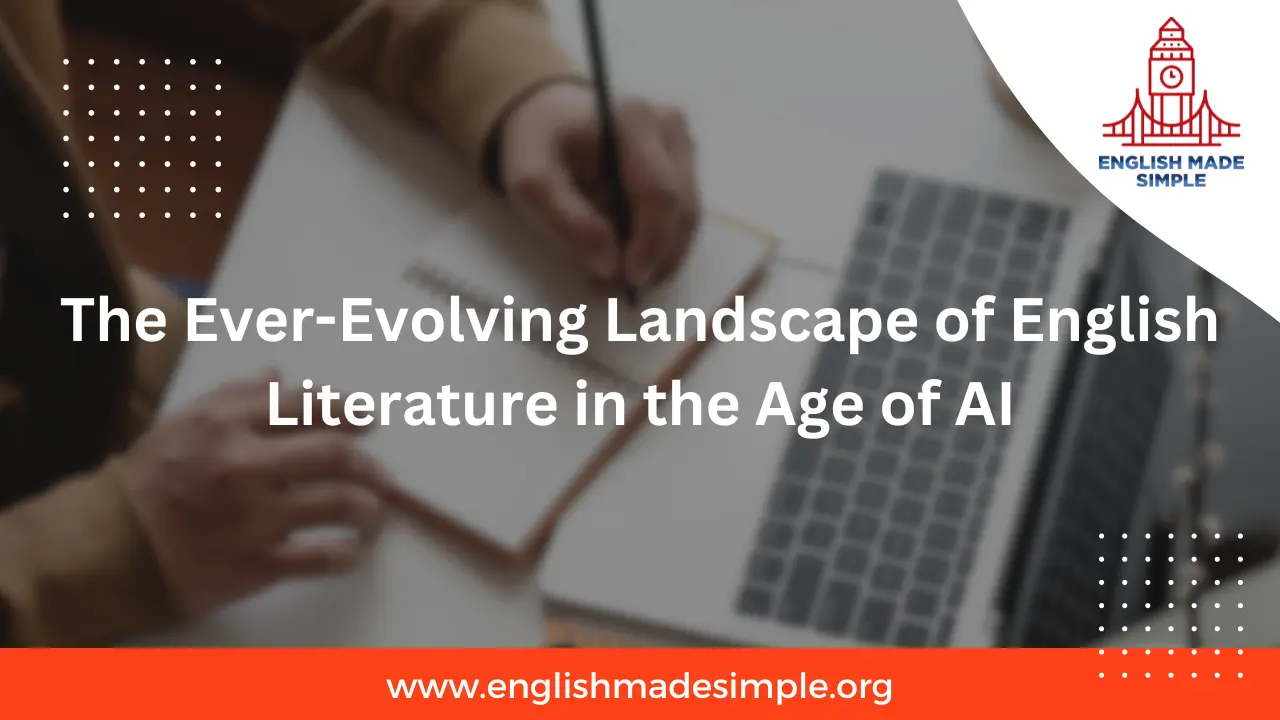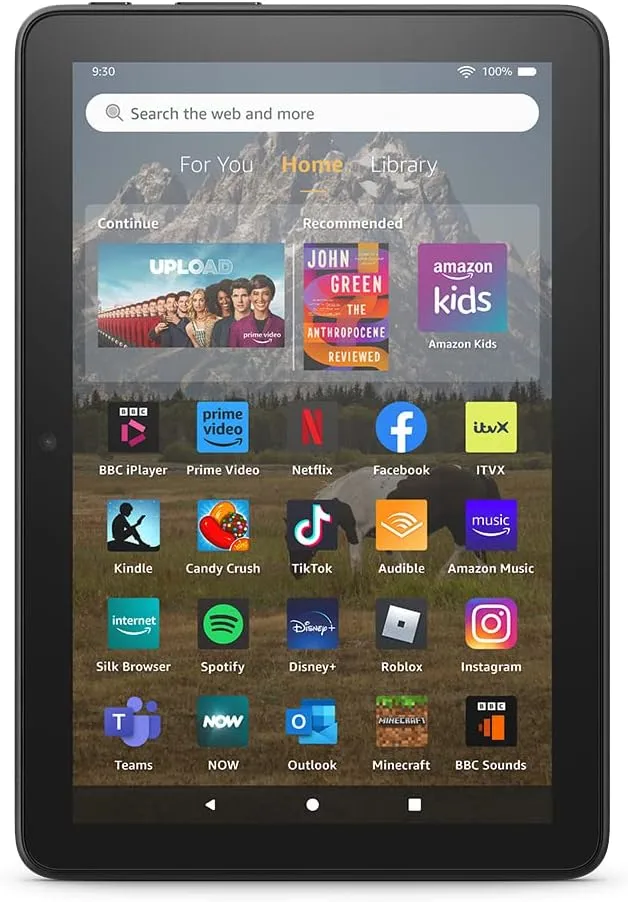
The Ever-Evolving Landscape of English Literature in the Age of AI
The field of English literature has undergone significant transformations in recent years, especially with the integration of Artificial Intelligence (AI) into various aspects of literary analysis, creation, and interpretation. Being an English literature graduate confers upon you the benefit of being viewed as ‘cultured’, but in terms of employability it can bring certain challenges. There are some obvious paths in terms of careers which would include becoming an English teacher, working in journalism or even if you have the resilience and fortitude becoming the next J.K. Rowling. But be warned becoming a successful writer or novelist is not something easy and Rowling herself endured a lot of difficulties in her life until she finally became well known and successful. Regardless of all this AI is changing our world and the field of writing. This article explores the intersection of English literature and AI, highlighting the challenges and opportunities that AI brings to this dynamic and rapidly changing field.
Evolution of Literary Analysis with AI
AI technologies, including natural language processing (NLP), machine learning, and deep learning algorithms, have revolutionized the way literary texts are analyzed and interpreted. Here are some key areas where AI is making an impact in the landscape of English literature:
- Text Analysis and Mining: AI-powered tools can analyze large volumes of literary texts to identify patterns, themes, and linguistic nuances. This analysis helps researchers and scholars gain insights into authorial styles, genre conventions, and historical contexts.
- Sentiment Analysis: AI algorithms can analyze the sentiment expressed in literary texts, allowing for a deeper understanding of characters’ emotions, narrative tone, and thematic variations. Sentiment analysis helps in identifying mood shifts, character development arcs, and narrative complexities. Of course AI cannot do this as well as a person and we still need humans and our unique ability to understand certain things that only we can and which machines cannot to perhaps make it as appealing as possible to our readers.
- Style Transfer and Generation: AI models can mimic the writing styles of famous authors or literary movements through style transfer techniques. Additionally, AI-generated content, such as poetry, short stories, and even novels, challenges traditional notions of authorship and creativity.
- Translation and Multilingualism: AI-powered translation tools enable the translation of literary works across languages, facilitating global accessibility and cross-cultural exchange of literary ideas and narratives. Google translate has changed the world for many people, making it easier to communicate or understand texts. Google translate albeit not perfect does at the very least give most of the time an approximate understanding of a text or on other times it has been noted to give very good translations. There is also Deepl from Germany as well as other online translators.
Challenges in AI Integration
While AI offers tremendous potential for enhancing literary analysis and creative expression, it also presents several challenges and ethical considerations:
- Bias and Representation: AI models trained on biased datasets may perpetuate stereotypes or underrepresent marginalized voices in literature. Addressing bias in AI algorithms is crucial for promoting inclusivity and diversity in literary analysis.
- Loss of Human Creativity: The proliferation of AI-generated content raises questions about the role of human creativity and authorship in literature. Balancing AI-generated works with original human-authored content is a topic of ongoing debate.
- Privacy and Data Security: AI tools that analyze personal writings or user-generated content raise concerns about privacy and data security. Safeguarding sensitive literary data and respecting authors’ rights are essential considerations in AI applications.
- Interpretation and Context: AI models may struggle with nuanced literary interpretation, contextual understanding, and symbolic meanings inherent in literary texts. Human expertise and critical analysis remain indispensable in literary scholarship.
Opportunities for English Literature Professionals
Despite the challenges, AI presents exciting opportunities for professionals in the field of English literature:
- Enhanced Research Capabilities: AI tools empower researchers and scholars to conduct comprehensive literary analyses, explore interdisciplinary connections, and discover new insights in literary studies.
- Innovative Teaching Methods: AI-powered educational platforms and virtual assistants can personalize learning experiences, offer interactive literary analyses, and engage students in digital literary explorations.
- Creative Collaboration: Collaborative projects between writers, poets, and AI developers foster experimentation, innovation, and hybrid forms of literary expression. AI can serve as a creative tool for exploring new narrative structures and stylistic possibilities.
- Accessible Literature: AI-driven accessibility tools, such as text-to-speech technologies and adaptive reading platforms, make literary content more accessible to individuals with visual impairments or learning disabilities.
AI Applications in Specific Literary Genres
Let’s explore how AI is applied in various literary genres and creative endeavors:
- Poetry Generation: AI algorithms trained on vast collections of poems can generate new poems in different styles, meters, and thematic motifs. These AI-generated poems often blur the boundaries between human and machine creativity.
- Narrative Analysis: AI tools can analyze narrative structures, plot arcs, character interactions, and dialogues in novels and short stories. This analysis provides valuable insights into storytelling techniques and reader engagement strategies.
- Genre Classification: AI algorithms can classify literary texts into genres based on linguistic features, thematic elements, and narrative patterns. Genre classification aids in literary categorization, recommendation systems, and reader preferences.
- Literary Criticism Assistance: AI-powered tools can assist literary critics and reviewers in analyzing literary works, identifying literary devices, and evaluating thematic coherence. AI-based literary criticism supplements human expertise and fosters deeper literary discussions.
Future Directions and Ethical Considerations
As AI continues to evolve, the future of English literature intertwines with ethical considerations and responsible AI practices:
- Ethical AI Development: Collaborative efforts among AI researchers, literary scholars, ethicists, and policymakers are essential for developing ethical AI models that prioritize fairness, transparency, and accountability in literary analysis.
- Human-AI Collaboration: Embracing a human-centric approach to AI, where humans and AI systems collaborate synergistically, fosters creative exploration, critical thinking, and responsible use of AI in literary endeavors.
- Cultural Preservation: AI technologies can contribute to preserving and digitizing cultural heritage, including indigenous literature, oral traditions, and endangered languages. However, cultural sensitivity and community engagement are paramount in such initiatives.
- AI Literacy: Promoting AI literacy among literary professionals, educators, and the general public cultivates informed discussions about AI’s impact on literature, creativity, and cultural expression.
Conclusion
The integration of AI into the landscape of English literature heralds a new era of literary analysis, creativity, and cultural exploration. While AI offers unprecedented capabilities for text analysis it also poses challenges related to bias, creativity, privacy, and ethical considerations. English literature professionals, AI developers, educators, and policymakers may need to consider collaborating to harness the potential of AI responsibly, foster inclusive literary practices, and uphold the richness of human creativity in the age of AI. However it is a reality which we have to live with and accept. However what is important to note is that literature is about the human experience. It is about experiences that we humans undergo and not what machines or AI computers go through. There is the human experience and then based on that writers create literature about that. No robot can fully understand any human experience fully as it is not a human. So AI can it could be argued never fully replace people in the field of literature.
Revolutionize Your Tech Experience: Explore the iPhone 14, Fire Tablet, and Asus Chromebook!

iPhone 14
Looking to upgrade your tech arsenal? Look no further! The iPhone 14 is the pinnacle of smartphone innovation, offering cutting-edge features and unparalleled performance. With its sleek design and powerful A16 chip, it delivers lightning-fast speeds for all your tasks and activities. Capture life's moments in stunning detail with its advanced camera system, and immerse yourself in vivid visuals on its vibrant Super Retina XDR display. Plus, stay connected like never before with lightning-fast 5G connectivity. Get your hands on the future of smartphones today!

Fire Tablet
If you're in need of a versatile tablet for both work and play, the Fire Tablet is your perfect companion. With its HD display, powerful performance, and access to millions of apps, games, and entertainment options, it's designed to keep you productive and entertained on the go. Whether you're streaming your favorite shows, browsing the web, or tackling work tasks, the Fire Tablet has you covered.

Asus Chromebook
And for those who need a reliable laptop for school, work, or leisure, look no further than the Asus Chromebook. Powered by Chrome OS, it offers lightning-fast performance, all-day battery life, and seamless integration with your favorite Google apps. Its sleek design and lightweight build make it perfect for taking on the go, while its robust security features keep your data safe and secure. Upgrade your tech game today with these must-have devices!
